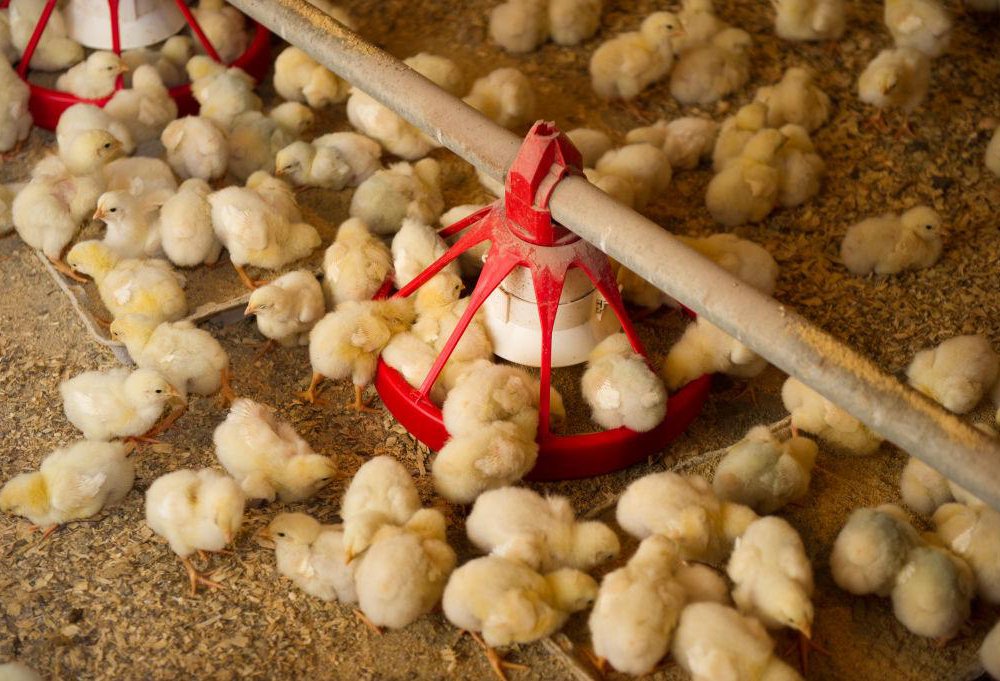A large majority of EU citizens agree that the killing of sentient beings without necessity is indefensible. Yet in the EU alone, upwards of hundreds of millions of baby chicks and ducks are killed annually, on industry orders, with full legal sanction.
How and why are these baby animals killed?
EU law currently allows two methods for the killing of day-old male chicks and female ducklings: maceration (most commonly called “grinding” or “shredding”) and asphyxiation with carbon gassing. Over time, the animal agriculture industry has engaged in increasingly selective animal breeding practices for productivity purposes.
However, while selective breeding of egg-laying hens has increased egg productivity, such a selection has also meant that male chicks no longer develop enough muscle to be used for meat. As a result, the industry kills its male chicks by the hundreds of millions because, though they are sentient creatures, these young animals are considered worthless in the broader pursuits of egg production and profit.
Similarly, foie gras producers – a notoriously brutal segment of the animal-source food industry – kill millions of baby female ducklings annually due to their smaller and more innervated liver, relative to males. The killing of female ducks is a less-known facet of the foie gras industry – an industry that inflicts excruciating force-feeding upon male ducks, enlarging their livers by ten times the normal volume.
Both methods (gassing and grinding) inflict a brutal and painful death upon these animals. Gassing does not induce immediate death, and an investigation by L214, a French animal welfare organisation, on the maceration of ducklings has demonstrated that some ducklings come out of the grinder with their necks broken, but still alive dooming them to a slow and excruciating death.
National efforts to stop the unjustified, mass killing of these sentient creatures
Thanks in large part to undercover investigations, which have galvanized public opinion against such methods, and sparked public investment in alternatives, the tide of history is turning against the mass, unjustified killing of day-old male chicks. Earlier this year, France, Germany, Austria, and Italy, harkening a sea change, have all enacted nationwide bans against chick killing. (However, some national bans, such as in Austria and France, still allow the killing of chicks for the purpose of pet food production, even though alternative protein sources for pet food exist.)
Additionally, and perhaps most significantly, the EU institutions have also been studying the possibility of imposing an EU-wide ban on the killing of day-old chicks, though hopefully such a ban will not be watered down by exemptions, such as an exemption permitting the killing of male chicks used for feed purposes.
The focus of such a ban, however, should not rest solely upon the male chicks, though they are killed in greater numbers; the mass killing of chicks and ducklings should be considered in tandem, due to the similarities in methods and conditions of elimination, and because the extinguishing of their young lives should carry the same moral weight. Also, national or EU-wide bans of this practice should not suffer any exceptions; it is not suddenly acceptable to kill day-old chicks or ducklings if they are used as pet food.
Today’s technology is sufficiently advanced to discriminate between males and females before hatching
One of the most significant technological developments which could hasten the end of the mass killing of chicks and ducks is “in-ovo sexing.” In-ovo sexing technology, which determines the sex of embryos, so that eggs from the unwanted sex can be destroyed at the incubation stage, is currently being utilized by the egg industry in France and Germany. Thanks to recent developments in this field, in-ovo sexing technology can also be applied to ducks. It is therefore possible to imagine a prohibition against the killing of male chicks and female ducklings in EU law.
Popular pressure spurring change
Popular pressure through citizen activism and advocacy campaigns has been an important factor in the struggle to end the unjustified, mass killing of chicks and ducklings. The results of a 2022 survey by L214/YouGov revealed that 76% percent of Germans, and 78% of Italian respondents, opposed the killing of day-old male chicks and female ducklings.
These public attitudes can be seen alongside, and due to, the expressions of anger and disgust that have followed undercover investigations on the matter. In the face of such significant societal demand, producers and retailers have issued some voluntary commitments to use alternatives to killing male chicks, primarily by resorting to in-ovo sexing.
The tide is turning in a positive direction on this issue, as the European Commission and the Council of the EU have already shown signs that they may be willing to issue a prohibition against chick culling in the EU.
The Commissioner for Health and Food Safety, Stella Kyriakides, told the agriculture ministers of Member States at the October 17th AGRIFISH Council : “The systematic killing of millions of day old male chicks in the laying hens sector is a very disturbing phenomenon and it does [...] raise important ethical concerns and highlights practices that come from a different time and age [...] I want to propose to phase out this practice and I hope I can count on your support”.
Statements like the one above are encouraging, and we call on the Commission to include a ban encompassing both the killing of chicks and ducklings in the upcoming animal welfare legislation. We furthermore call on all MEPs and Member States to support such a ban. Finally, we call upon all EU legislators to ensure that this ban will not be weakened by exemptions. Full stop: the killing of hundreds of millions of chicks and ducklings must end.
Co-signed by:
Alice Di Concetto, Chief Legal Adviser, The European Institute for Animal Law & Policy
Brigitte Gothière, Director, L214
Dr Olga Kikou, Head of Compassion in World Farming EU
Dr Joanna Swabe, Senior Director of Public Affairs, Humane Society International/Europe
Joe Moran, Director, European Policy Office, FOUR PAWS
Alina Puiu, General Manager, F.R.E.E.

